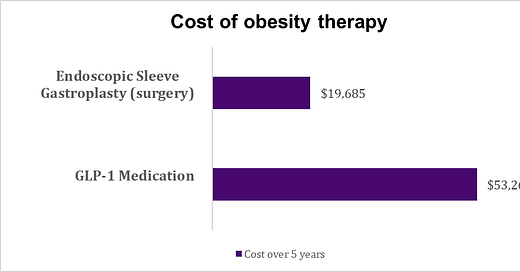Source: Haseeb, et al JAMA Network Open April 12, 2024 LINK
GLP-1 drugs are highly effective, and on average people are able to lose about 15% of their body weight with weekly self-injections. The drugs, semaglutide (Ozempic and Wegovy) and tirzepatide (Mounjaro and Zepbound) are very expensive, with list prices of over $15,000 annually, and net employer prices of about $9,000 annually after rebates and discounts. Liraglutide, a daily anti-obesity drug, is somewhat less effective and just as expensive.
Bariatric surgery is also highly effective in lowering patients’ weight. The two surgeries now performed most often, gastric sleeve (sleeve gastroplasty) and bypass (Roux en Y) are well tolerated and rarely require revisions. Patients commonly lose 15% or more of their body weight after these procedures. Laparoscopic band surgery is now rarely performed because of high failure rates.
JAMA Network Open published a study earlier this month that modeled the impact of endoscopic sleeve gastroplasty (bariatric surgery) and injected semaglutide (GLP-1) for a synthetic study group of those with a Body Mass Index (BMI) between 35 and 40. They evaluated the cost of each intervention, including cost of complications, and assessed how much cost was incurred to achieve each quality adjusted life year (QALY) over a 5-year time horizon (with 3% discounting). They found that bariatric surgery was less costly and provided more QALYs than semaglutide. They calculated that semaglutide, which now costs about $9,000 a year after rebates and discounts, would have to be priced at $3,590 per year to achieve costs of $100,000 per QALY.
Implications for employers:
Bariatric surgery, such as endoscopic sleeve gastroplasty is cost-effective, meaning that the plan spends under $100,000 per quality adjusted life year saved.
GLP-1s are less cost effective than bariatric surgery, and at current prices don’t meet most public policy cost-effectiveness thresholds.
Note that the substantial weight loss from either GLP-1s or bariatric surgery is likely to have higher amounts of cost saving and QALY generation beyond the five years modeled in this study, as many of the complications of obesity are expressed later.
These researchers did not account for decrease in other medications and office visits, so the cost effectiveness might be somewhat higher than the authors have expressed.
Employers that do not provide coverage for GLP-1 medication for obesity can offer bariatric surgery as an option.
Thanks for reading. You can find previous posts in the Employer Coverage archive
Please subscribe, “like” and suggest this newsletter to friends and colleagues. Thanks!
Tomorrow: What you need to know about GLP-1 side effects



